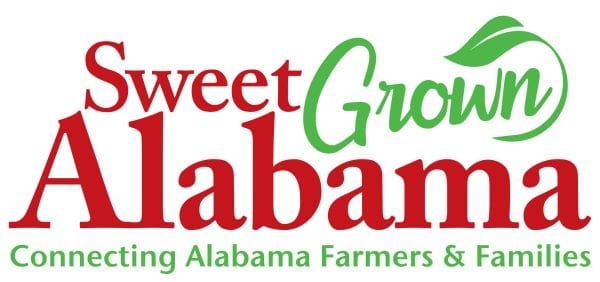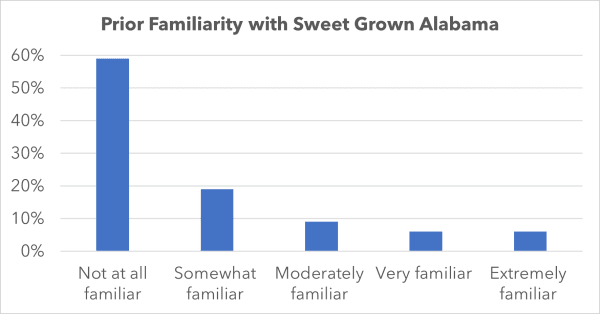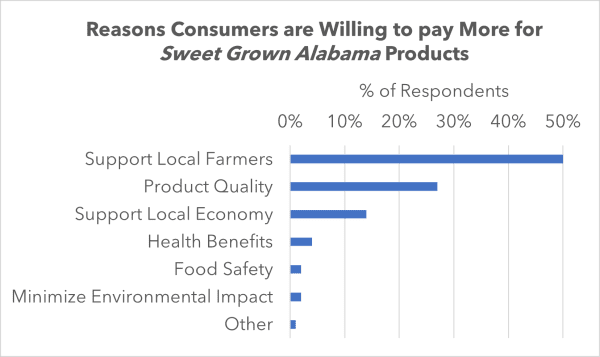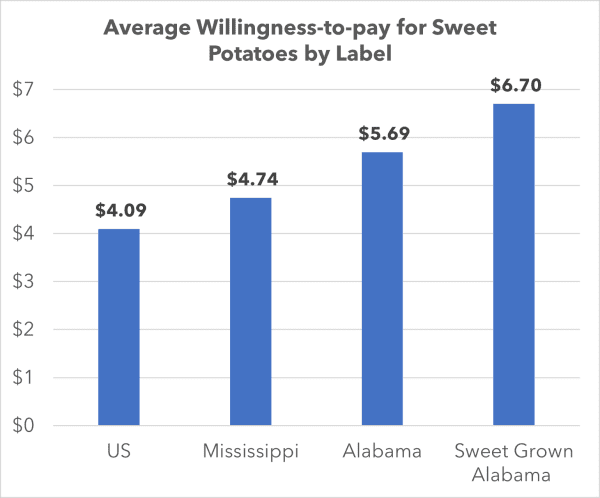Crop Production

Introduction
 A research team with the Alabama Cooperative Extension System and the Auburn University College of Agriculture recently employed an economic experiment to collect data on consumer willingness to pay for differently labeled sweet potatoes at Alabama farmers markets. Data were collected from September through November 2022 in three Alabama areas (Huntsville, Birmingham, and Baldwin County) at five different farmers markets. The research used a real-life experiment in which 100 participants bid to purchase four differently labeled baskets of sweet potatoes, revealing the maximum amount they would be willing to pay for each basket. Data collection also included a survey, which provided information on participants’ familiarity and beliefs about the Sweet Grown Alabama marketing program, which launched in August 2019.
A research team with the Alabama Cooperative Extension System and the Auburn University College of Agriculture recently employed an economic experiment to collect data on consumer willingness to pay for differently labeled sweet potatoes at Alabama farmers markets. Data were collected from September through November 2022 in three Alabama areas (Huntsville, Birmingham, and Baldwin County) at five different farmers markets. The research used a real-life experiment in which 100 participants bid to purchase four differently labeled baskets of sweet potatoes, revealing the maximum amount they would be willing to pay for each basket. Data collection also included a survey, which provided information on participants’ familiarity and beliefs about the Sweet Grown Alabama marketing program, which launched in August 2019.
Alabama Farmers Markets in this Study
| Market Name | City | Number of Participants |
|---|---|---|
| Coastal Alabama Farmers and Fishermens Market | Foley | 24 |
| Ross Bridge Farmers Market | Hoover | 13 |
| The Market at Pepper Place | Birmingham | 31 |
| Madison County Farmers Market | Huntsville | 18 |
| The Market at MidCity | Huntsville | 14 |
| Total | 100 |
Results
Participants were asked to rate their familiarity with Sweet Grown Alabama before taking part in the experiment. A majority of respondents (59 percent) indicated that they previously were not at all familiar with the Sweet Grown Alabama label, followed by 19 percent stating that they were somewhat familiar. There was a wide variation in familiarity across the different markets. For example, only 8 percent expressed some degree of familiarity at the Ross Bridge Farmers Market, whereas 67 percent had some degree of familiarity at the Madison County Farmers Market. During the experiment, all participants were given basic information about the program.

The survey also asked participants to identify the primary reason why they believe that some consumers would be willing to pay a higher price for a Sweet Grown Alabama product compared to a product from an unknown origin. Half of the respondents indicated that the main reason was to support local farmers, 27 percent believed it was because Sweet Grown Alabama products are of higher quality, and 14 percent said to support the local economy. Less than 5 percent of participants reported that they thought health benefits, food safety, or minimizing environmental impact are the main reasons consumers would be willing to pay more for Sweet Grown Alabama products.

* Other included the belief that Sweet Grown Alabama products are organic
Participants were asked the maximum amount that they would be willing to pay for four differently labeled, but otherwise comparable, baskets of sweet potatoes. 1 The labels on the baskets were described as being from the following areas:
- a farm that is located in the US but not in Alabama
- a farm in Mississippi
- a farm in Alabama
- a farm in Alabama that carries the Sweet Grown Alabama label
The research team found that the average maximum amount that consumers would be willing to pay ranges from $4.09 for sweet potatoes labeled as being from a farm in the US but outside of Alabama to $6.70 for the basket of sweet potatoes from a Sweet Grown Alabama farm.

Label Definitions
US: A basket of sweet potatoes from a farm that is located in the US but not in Alabama
Mississippi: A basket of sweet potatoes from a farm in Mississippi
Alabama: A basket of sweet potatoes from a farm in Alabama
Sweet Grown Alabama: A basket of sweet potatoes from a farm in Alabama that carries the Sweet Grown Alabama label
Data analysis shows that at an Alabama farmers market, Sweet Grown Alabama sweet potatoes will have an average price premium of $2.61 more than a comparable basket from an unknown origin in the US. Sweet Grown Alabama sweet potatoes also have an average price premium of $1.96 over a basket from neighboring Mississippi.
Lastly, the research team compared the willingness to pay for sweet potatoes from an Alabama farm with an identical basket that includes the Sweet Grown Alabama label. This provides evidence about how farmers market consumers view the Sweet Grown Alabama brand. Despite respondents’ relatively low initial familiarity with the brand, they still report an average $1.01 premium over a similar state-grown product that lacks the Sweet Grown Alabama label.
1 Each basket consisted of 4-5 sweet potatoes of the Covington or Beauregard variety and of similar quality. Each basket contained potatoes that were sourced as labeled. This type of experimental method has been used before in peer-reviewed research studies (see Bernard, Duke, Albrecht. 2019. “Do labels that convey minimal, redundant, or no information affect consumer perceptions and willingness to pay?” Food Quality and Preference 71:149-157).
This research was supported by funding from the Auburn University Department of Agricultural Economics and Rural Sociology, the Alabama Agricultural Experiment Station, and NIFA-Hatch.

